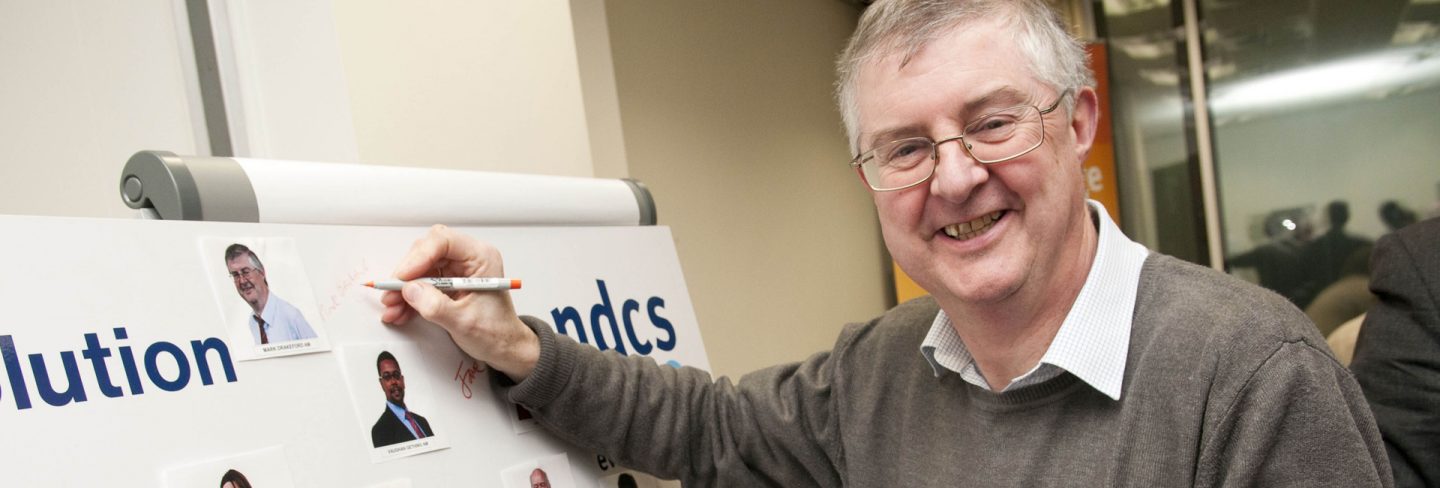As Eisteddfod rushes on apace and MPs rest up, Mark Drakeford, the Cabinet Secretary for Finance and Local Government and AM for Cardiff West since 2011, took an hour to talk to us at Wales Council for Voluntary Action’s headquarters, on Brexit and Young People.
This blog aims to pull out the key messages from the discussion, and raise any interesting points.
Brexit will be an act of self-harm for all in the UK, the ones it will affect the most are those already in poverty. This impact could be greater or lesser, depending on how the leaving process is handled. The Welsh Government is not currently focusing on the journey of leaving, rather the positions which they must take, and hold, in order to safeguard what the UK holds dear.
Drakeford highlighted that the damage of Brexit has already begun, with a hit of 2% on the UK’s economy corresponding to approximately £905 per household in the UK. Less money to pay taxes results in lower taxes, which result in less public services, an area which, especially around young people, is already in crisis mode. A hard Brexit would be even more detrimental, a hard Brexit which is much more likely than it was 6 months ago. Theresa May’s ability to negotiate with the EU is weak, due to the reputation of her government, and her ability to negotiate within the House of Commons to reach an agreement on Brexit is even weaker. The UK is not yet in this position, an agreement is the most likely option, but the risk of Theresa May being unable to reach any majority in the House of Commons is high. This follows the theme, the main blockers for a deal on Brexit are in London, not in Brussels.

Mark Drakeford AM – Image from www.markdrakeford.com
Drakeford posited 3 potential results of the next year:
a) The House of Commons could take ownership of the situation, this is the opinion of Hillary Benn, that the House of Commons will take the agenda from the executive to the legislator. It could be possible to have a majority in the House of Commons, and if the government fails to persuade the House of Commons, they can ask for a new agenda.
b) A referendum on the agreement, a People’s Vote. He warned, if this was to happen, to be prepared for a bitter, grim battle, in which the lies of 2016 would look tame in comparison.
c) If there is complete disagreement within the House of Commons, there could be a general election, requiring votes over Christmas.
His summary of the current situation was that the UK is incredibly divided. Half of the population feel as though their opinion is being ignored, while elements of the other half feel that anything but the hardest of Brexits is a betrayal.
Erasmus+ is often discussed in London, the funding stream for this finishes in 2020, and there are a number of people involved in negotiations who support the access of future EU funding pots of this form. Drakeford also highlighted the two way nature of the funding, that it means young people will come to the UK, and must be welcomed, where it is clear in recent surveys of young people that that is not the case. In the report I helped to create as a UK Young Ambassador with the British Youth Council, we pulled out statistics that demonstrate that hate crime toward LGBTQ young people and young people of colour has increased after the referendum in 2016, which supports work done by research for LSE to show a similar conclusion. Our report showed that half of young people we surveyed feel that the world is changing for the worse after Brexit, and this sense of divide can be seen in Ipso MORI’s new report on ‘Beyond Binary: The life and choices of Generation Z’, which shows young people have a historically low concern about immigration, which is definitively incongruous with other age ranges in the UK. Being part of funding streams such as Erasmus+ requires a two-way relationship, and it seems like Brexit has damaged the preexisting one.
Drakeford also highlighted that it was important for the Welsh Government to use the networks they already have to help the vulnerable on the ground who may be harmed by the rise in hate-crime.
The final message was that we are leaving the EU, not Europe – and it is more important than ever to build strong relationships within Europe with those who are willing to work with the UK, to make good contacts, as this is the only way Brexit will actually work.




